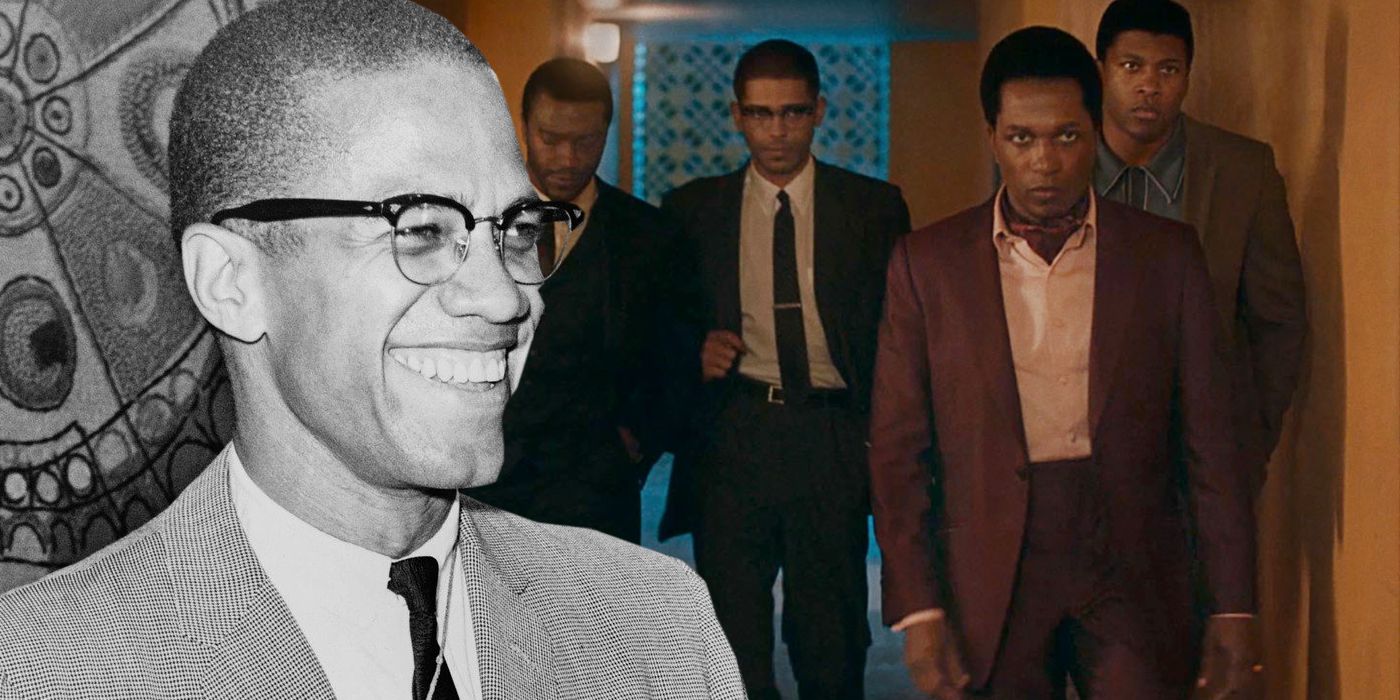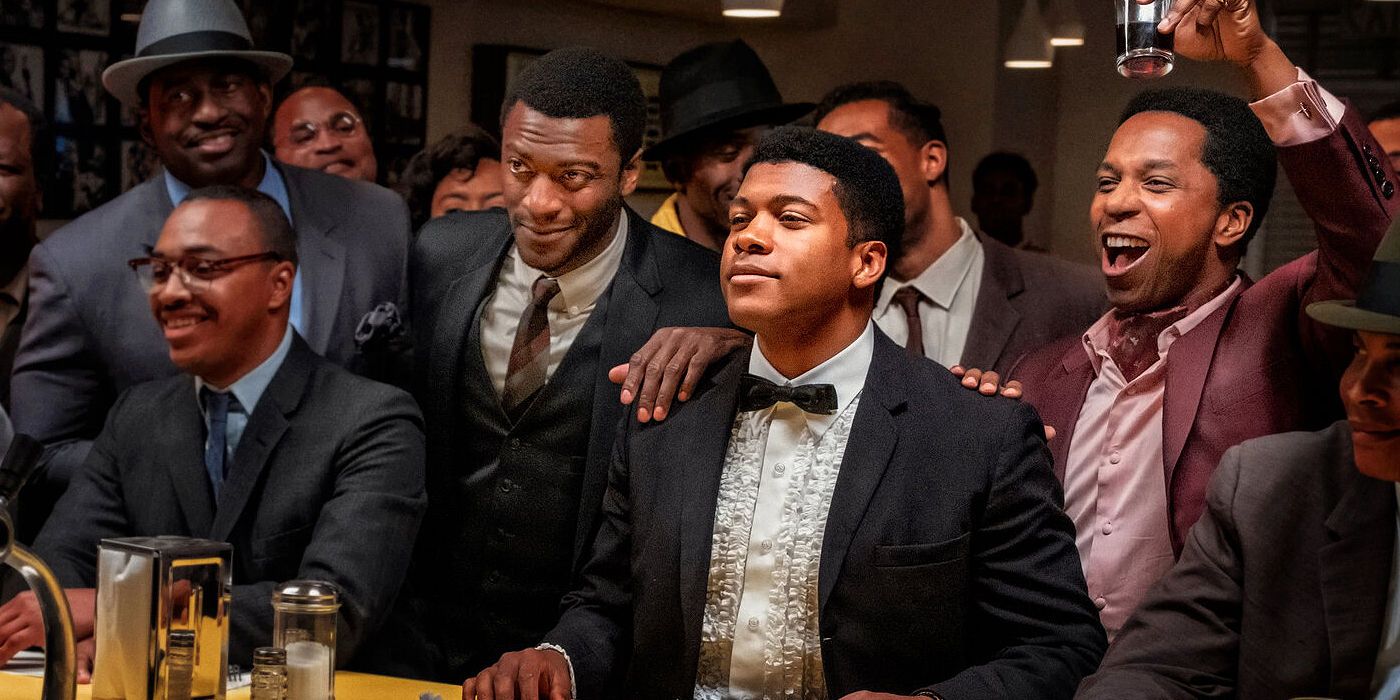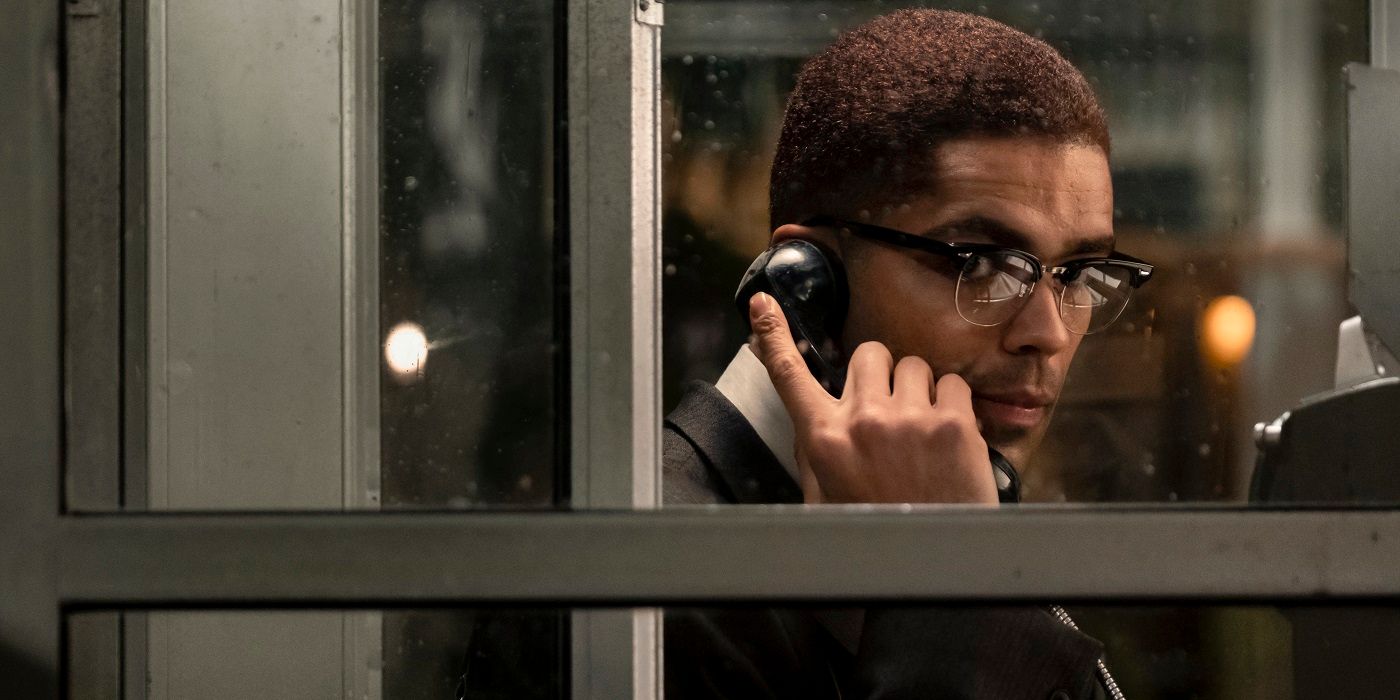The film One Night in Miami is a fictionalized account of the real-life meeting between four prolific figures in Black history. The film marks the big-screen directorial debut of Regina King (Watchmen), who became the first Black female filmmaker to screen a film at Venice International Film Festival, and is based on the play written by Kemp Powers, who also penned the screenplay. The movie recreates and reimagines the events that occurred on February 25, 1964, at the Hampton House Motel in Overtown, FL, when boxer Cassius Clay (Eli Goree), civil rights activist Malcolm X (Kingsley Ben-Adir), singer and songwriter Sam Cooke (Leslie Odom Jr.), and Cleveland Browns running back Jim Brown (Aldis Hodge) gathered together to celebrate Clay's victory over Sonny Liston earning him the title of heavyweight champion of the world.
Following 22-year-old Clay's match and surprise victory, the men meet in Malcolm's hotel room (yes, there was ice cream), but the celebration takes on a somber tone as the friends discuss their careers, social justice, racial inequality, ideological differences, and the burdens and responsibilities they bear as public figures during the height of the Civil Rights Movement.
During an appearance on the Write On podcast, Kemp described One Night in Miami as "a work of fiction powered by the truth." The movie is a period drama that uses historical references to piece together imagined conversations between four friends who also happen to be cultural icons. Given the activism and protests surrounding the deaths of George Floyd and Breonna Taylor, and President Donald Trump's reluctance to admonish the actions of white supremacists throughout his term in office, the debates that occur between the men are as relevant now as they were prescient when the play premiered in 2013. Still, how much of it is based on true events and how much is pure fiction?
How Much Of One Night In Miami Is Real?
The character fueling most of the racially charged discourse in the film is Malcolm X. The other men admonish Malcolm for comments he made in 1963 following President John F. Kennedy's assassination, specifically Malcolm's callous assessment that the tragedy was a case of "chickens coming home to roost." The on-screen drama is intensified by Malcolm's paranoia regarding the lurking presence of two white men outside his room (the FBI stepped up its surveillance of Malcolm in 1964) and his desperation to secure Clay's allegiance.
In addition to being close friends, Malcolm served as Clay's spiritual advisor, and the fighter paid for Malcolm to attend his bout with Liston, which created a large amount of controversy at the time, a fact the film largely glosses over. According to Johnny Smith, co-author of the book Blood Brothers: The Fatal Friendship Between Muhammad Ali and Malcolm X, Clay and Malcolm met in 1962. Malcolm seized on the opportunity to recruit Clay into the Nation of Islam (NOI), viewing it as an opportunity to draw more attention to the movement. Clay announced he'd joined the Nation of Islam at a post-fight press conference the following morning and that moving forward, he'd be known as Cassius X. In March, Clay changed his name to Muhammad Ali, and he aligned himself with Elijah Muhammad after Malcolm officially denounced the Nation in 1964, effectively ending their friendship.
Meanwhile, Jim Brown was ringside that night providing radio commentary, and according to Jim Brown: Last Man Standing, the NFL legend had planned a huge post-fight party, but Clay told Brown, “No, Jim. There’s this little black hotel. Let’s go over there. I want to talk to you.” In the film, Brown is contemplating forsaking football in favor of acting, and he confides in Clay that he's about to make his big-screen debut. Clay is dismissive of Brown's acting aspirations when he learns Brown's character dies halfway through the film (The movie in question is Rio Conchos.) Following the summit at the motel, Brown is shown retiring from football, although the narrative feels like it expedites the timeline. Brown did walk away from his football career, but announced his departure in 1966 while on The Dirty Dozen's London set.
Sam Cooke was a commercially successful singer who exerted a level of control over his career that was almost unheard of at the time. Brown points out that Cooke enjoys an autonomy that he and Clay do not, and unlike Malcolm, Cooke has a real job. Cooke wrote his own songs, owned the publishing rights to his work, and founded a record label that showcased Black artists. Before meeting up with his friends, Cooke is seen in his Fontainebleu Hotel room working on the song "Put Me Down Easy," which would later be recorded by Cooke's brother L.C. and released by Cooke's label, SAR Records, according to an article in Vulture. The article also identifies the Rolling Stones cover that generated large royalty payouts to another of his artists was "It's All Over Now," originally recorded by The Valentinos.
In the final moments of the movie, Cooke performs one of his most enduring classics "A Change is Gonna Come" (the song became an anthem for the Civil Rights Movement) on The Tonight Show Starring Johnny Carson, but, sadly, footage of the performance was lost over time. The song was released as a single two weeks after Cooke was shot and killed by a Los Angeles motel owner in 1964.
What One Night In Miami Makes Up
Kemp takes a great deal of creative license when it comes to what actually transpired behind the closed doors of Malcolm's hotel room. One Night in Miami gives undue credit to the impact the gathering had on the men as they moved forward with their lives. In an article written for Slate, Jack Hamilton asserts that Cooke is the most egregiously misrepresented character in the film. Malcolm demeans Cooke's considerable talent and accuses the singer of catering to a white audience with frivolous love songs like "You Send Me," and his rendition of Nat King Cole's "For Sentimental Reason" both recorded in 1957. According to Hamilton, by 1960 "Cooke’s songwriting had evolved past the formula he rode to success ... " with the songs "Chain Gang," "Having a Party," and "Bringing It On Home to Me."
Malcolm whips out Bob Dylan's "Blowin' in the Wind" as an example of the type of music that Cooke should be aspiring to produce. While Cooke was partially inspired by Dylan, according to author Peter Guralnick, who wrote Dream Boogie: The Triumph of Sam Cooke, it was an event in 1963 that "directly triggered" Cooke to write "A Change is Gonna Come" and not Malcolm's urging. Cooke protested vehemently after he was turned away from a whites-only Holiday Inn in Shreveport, LA. The singer was arrested for disturbing the peace and spent several hours in jail. Cooke wrote the song in December that same year, several months before the Liston-Clay fight.
The relationship displayed in the film between Malcolm and Cooke is the most contentious. Powers told IndieWire the sparring between Malcolm and Cooke was based on his own experiences as the only writer of color for the show Star Trek: Discovery. "How much of myself do I have to sacrifice to be accepted in this environment, in this world? My psyche was split down the middle. I put these arguments back into the mouths of the men who inspired that way of thinking,” Powers said. Things simmer down between the two when Malcolm affectionately recalls a Cooke show he attended in Boston. In the film, Jackie Wilson sabotages the sound system, leaving Cooke to pacify an angry crowd which he does by performing an a capella version of "Chain Gang." When speaking about the film on the Write On podcast, Powers said the flashback was "a composite of several shows."
One Night in Miami addresses Malcolm's increasingly contentious relationship with the Nation of Islam's (NOI) leader, Elijah Muhammad. In the film, Malcolm's growing disillusion is mainly attributed to Muhammad's extramarital affairs, which flew in the face of his teachings. However, it was Malcolm's remarks about John F. Kennedy that actually marked a significant turning point in their relationship. Feeling overshadowed by Malcolm and frustrated by his defiance, Muhammad prohibited Malcolm from speaking publically for three months.
The suspension led to Malcolm breaking ties with the NOI in a public and truculent manner in March 1964. As reported by The New York Times, Malcolm planned to organize a "black nationalist party." In the film, Malcolm reveals his intention to leave the NOI to the other men, which triggers a fight with Clay, who believes he's being used, an accusation Malcolm adamantly denies. Still, Clay asks Malcolm to stand beside him outside the hotel as he announces his indoctrination into the NOI. In reality, Clay broke the news during a standard post-fight press conference at the Miami Beach Convention Hall. The dissension between the two before the announcement in One Night in Miami is born out of Powers' imagination. Ultimately, it was Clay's decision to turn his back on Malcolm that ended their association.



